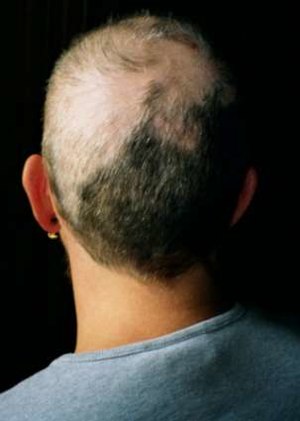The disease that takes away your hair is called alopecia. It can be caused by a variety of factors, including genetics, autoimmune diseases, and certain medications. Alopecia can lead to complete baldness or just thinning of the hair on the scalp.
There is no cure for alopecia, but there are treatments available to help improve the appearance of the hair.
There are a few diseases that can cause hair loss. One of them is alopecia areata, which is an autoimmune disease that attacks the hair follicles. This can cause patchy hair loss or complete baldness.
Another disease that can lead to hair loss is lupus, which is a chronic inflammatory disease. Lupus can damage the hair follicles and cause scarring on the scalp, leading to hair loss. Lastly, cancer treatments such as chemotherapy and radiation therapy can also cause hair loss.
Table of Contents
Psychological Disorder Makes People Pull Out Their Own Hair
What Diseases Can Make You Lose Your Hair?
There are many diseases that can cause hair loss, some of which are temporary and others permanent. Common causes of temporary hair loss include:
– Telogen effluvium: This is a condition in which the hair follicles go into a resting phase and then shed six to eight weeks later.
It can be caused by things like stress, pregnancy, crash dieting, or certain medications.
– Alopecia areata: This is an autoimmune disorder in which the body attacks its own hair follicles, causing patchy hair loss. It is thought to be triggered by stress.
– Anagen effluvium: This is a type of hair loss that occurs when the cells responsible for new hair growth are damaged. It can be caused by certain chemotherapy drugs used to treat cancer.
Permanent hair loss can also occur as a result of disease.
Some examples include:
– Lichen planopilaris: This is a rare autoimmune disorder that affects the scalp specifically, causing inflammation and scarring that leads to permanent hair loss.
– Cicatricial alopecia: This is another type of autoimmune disorder that destroys the Hair follicle and replaces it with scar tissue.
It can be caused by various conditions, including lupus erythematosus and frontal fibrosing alopecia.
– Trichotillomania: This is a mental disorder characterized by compulsivehair pulling, which leads to baldness in severe cases.
What Autoimmune Disease Causes Hair Loss?
There are a variety of autoimmune diseases that can cause hair loss. One of the most common is alopecia areata, which is an autoimmune disease that attacks the hair follicles. This can result in patchy hair loss on the scalp, face, and body.
Other autoimmune diseases that can cause hair loss include lupus erythematosus, discoid lupus erythematosus, and frontal fibrosing alopecia.

Credit: en.wikipedia.org
Which Vitamin Deficiency Causes Hair Loss
One of the most common vitamin deficiencies that can cause hair loss is a lack of vitamin D. This essential vitamin helps to keep our bodies healthy by promoting calcium absorption and helping to maintain strong bones. Without enough vitamin D, our hair follicles can become damaged and weak, leading to thinning hair and eventually hair loss. Other vitamins that play a role in healthy hair growth include vitamins A, B, C, and E. While deficiency in any of these vitamins can contribute to hair loss, making sure you’re getting enough of them through diet or supplementation is key to keeping your locks looking full and healthy.
Illnesses That Cause Hair Loss
There are many illnesses that can cause hair loss. Here are some of the most common ones:
1. Alopecia areata: This is a condition that causes patchy hair loss.
It can be caused by an autoimmune reaction, where the body’s immune system attacks the hair follicles.
2. Trichotillomania: This is a condition where people have an irresistible urge to pull out their own hair. The hair loss can be patchy or complete.
3. Telogen effluvium: This is a type of temporary shedding that happens when there is a change in the growth cycle of the hair follicles. It can be caused by stress, pregnancy, childbirth, menopause, thyroid problems, and certain medications.
4. Scalp infections: Infections of the scalp, such as ringworm or impetigo, can lead to patches of baldness.
Can Hair Loss Be a Sign of Something Serious
Hair loss can be a sign of many different things, some of which are more serious than others. It can be a sign of aging, or it can be a symptom of an underlying medical condition. If you are experiencing hair loss, it is important to see your doctor to find out what is causing it.
There are many potential causes of hair loss, so your doctor will need to rule out any underlying medical conditions before making a diagnosis.
Conclusion
Alopecia is a disease that causes hair loss. It can be caused by many things, including genetics, autoimmune diseases, and even certain medications. There are many different types of alopecia, and each one has its own set of symptoms and treatment options.
The most common type of alopecia is Androgenetic alopecia, which affects both men and women. This type of alopecia is usually genetic, meaning it runs in families. Other types of alopecia include Alopecia Areata, which causes patchy hair loss; Telogen Effluvium, which is a temporary form of hair loss often caused by stress; and Scarring Alopecias, which destroy the hair follicles and cause permanent hair loss.
While there is no cure for alopecia, there are treatments available that can help improve the appearance of the hair and prevent further hair loss.
